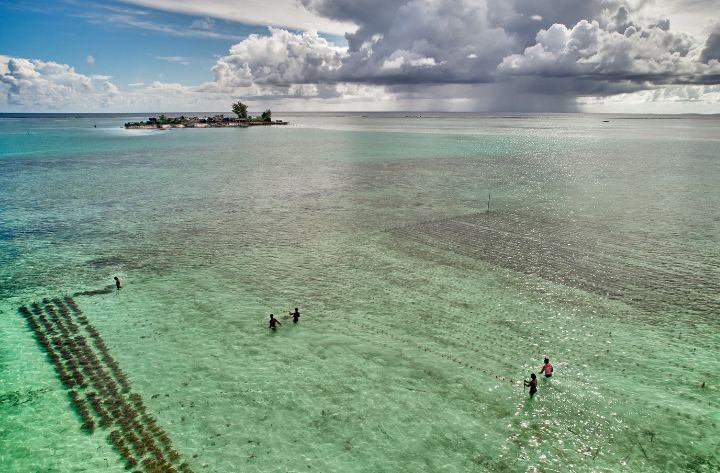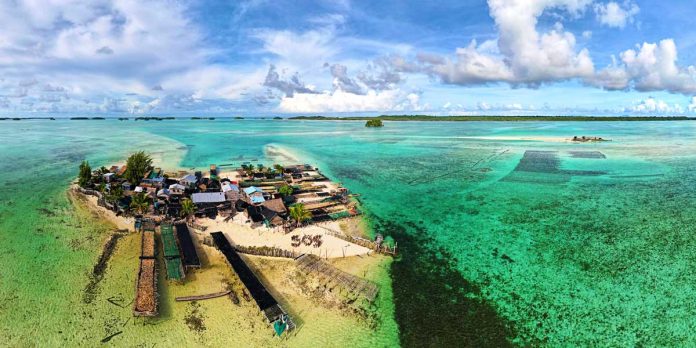In August 2022, I was the first foreigner to visit Beniamina in some years. When I arrived, the island Chief banged on an old diving cylinder as a bell to summon villagers to the maneaba (meeting house). Elders told me they wanted to communicate to the outside world how vulnerable their Solomon Islands home had become.
I offered to use my drone to show from the air just how closely the sea was approaching. The village children took a break from home schooling to hold hands and form an SOS – a traditional maritime distress code.
The seaweed farming families of Beniamina (Peniamina, population 130) cling to a precarious existence atop a vanishing coral reef island. The Solomon Islands have become a sea level rise hotspot, with Pacific Ocean waters rising three times the global average there at 7-10 millimetres per year.
Five islands of the Beniamina atoll, which have existed some 300 years, have disappeared in recent years, under some of the fastest rising seas in the world.

The farmers’ fast growing Kappaphycus seaweed crop absorbs large amounts of carbon dioxide in the six weeks it takes to mature. But increasingly intense storm systems can rip whole lines of seaweed from the underwater tethered stakes. Meanwhile, the multitude of seaweed varieties are gradually being reduced to one predominant colour by rising ocean temperatures and acidity.
The islanders’ produce is sold to France, Vietnam and China: an important source of foreign exchange for the Solomons. But Beniamina, like its neighbouring lagoon islands, is disappearing rapidly: large parts of the village and its drying tables, divided between the remaining 20-odd families, have been washed away when storms breach makeshift sea walls made of dead coral. Its rapid rate of erosion – losing over 50 per cent of its size in the last decade – offers a vision of the future for coastal communities around the world.
In Beniamina’s case, the Pacific Regional Environment Program recommended revegetation and has also proposed to install 300 submerged concrete “reef balls” to minimise coastal erosion and increase resilience while also providing hollowed-out habitats for marine life. But it’s unclear how this might be funded.
For all the talk of “loss and damage” and climate adaptation funding at global climate conferences (including COP27 declaring it will establish a fund to compensate vulnerable nations for “loss and damage” from climate-induced disasters), no funding has been forthcoming for Beniamina.

In January, I heard from seaweed famer Andrew Nakuau that they’d survived their annual Christmas king tides in 2022 which were “very high” and their sea wall was damaged. Some homes were gone too, he wrote, “[and] it’s a sad full thing for us here”. There’d also been no word of any help.
Rising seas due to ice melt and ocean thermal expansion now have such momentum that they will continue for at least 150 years after developed nations and their industrial greenhouse gas emissions. Yet those least responsible for the causes (be they First Nations, women, future generations) stand to suffer the greatest loss of lives, livelihoods, land and culture. This is what climate justice is about, and it’s acutely felt by the inhabitants of Beniamina in their South Pacific Ocean island home.
The average Solomon Islander has a fossil fuel footprint of just 430 kilograms per year. Yet, they face the second highest exposure to disaster risk globally according to the 2021 World Risk Report and potentially the greatest loss of lives, livelihood, land and culture from climate change. The Solomons and other small island states are thus leading the charge for climate justice.
Neighbouring Vanuatu, for example, is asking the International Court of Justice for an opinion on the responsibilities of developed countries on climate change. There may be legal demands for compensation (and taking climate refugees) made of countries including Australia.
The big breakthrough of COP27 was the agreement to establish a fund for loss and damage. This would involve wealthy nations compensating developing states for the effects of climate change, especially droughts, floods, cyclones and other disasters.
Who pays and who benefits is a battle to come. But how long must Beniamina wait for help?
_______________
Adam Sébire is an Australian artist-filmmaker.





